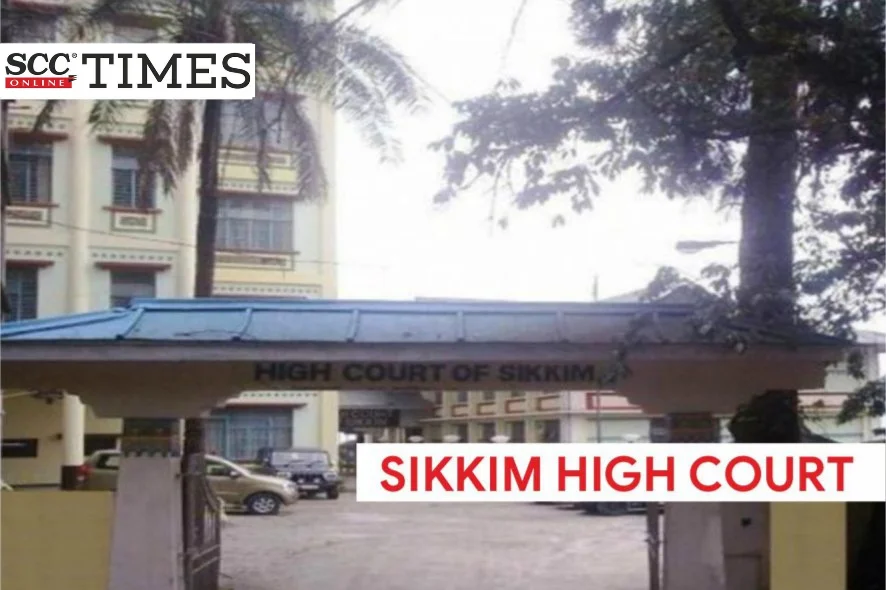Sikkim High Court: The instant application was made under Section 347(2) of the Code of Criminal Procedure, 1973 (“CrPC”), filed by a POCSO-convict aggrieved by the judgment of the Court of Special Judge, POCSO Act, 2012 (“Special Judge”/“POCSO Court”), wherein he was convicted on three grounds under the POCSO Act and sentenced to rigorous imprisonment for five years with fines imposed. The convict contended that the Special Judge did not consider that he was a minor at the time of the commission of the offence. . The Single-judge Bench of Meenakshi Madan Rai, J* perusing the contentions, agreed that the convict’s contentions regarding wrong computation of age cannot be faulted and held that the convinctwas a minor at the time of the offence, and his incarceration beyond three years would be illegal, and therefore set him at liberty.
Background
The convict preferred an appeal against the impugned judgment of the Special Judge from 2021 that convicted him of Sections 9(l), 9(m), 9(n), punishable under Section 10 of the Protection of Children from Sexual Offences Act, 2012 (“POCSO”), sentencing him to five years imprisonment for all offences, running concurrently along with fines. The convict had already served three years of his sentence.
The convict contended that the Special Judge of the POSCO Court did not properly compute his age at the time of the commission of offence(s) during the trial, pursuant to which an application was made before the instant Court under Section 9 of the Juvenile Justice (Care and Protection of Children) Act, 2015 (“JJ Act”) in November 2023.
It was urged by the counsel for the convictt that his date of birth (“DOB”) was 31-03-1998, and the offence was committed in 2015 as per the victim’s statement under S. 164 of CrPC ; and the charges framed by the POCSO Court. In conclusion of the Section 9 application, the instant Court had directed the POCSO Court to determine if the convict was a minor at the time of the offence.
Pursuant to the directions, the Special Judge submitted a communication, finding that the date of incident for the purpose of computation of his age at that time was taken as 31-12-2017, making him almost 20 years old at the time of the incident.
Aggrieved by this communication, the convict filed an objection before the instant Court on multiple grounds.
The Additional Public Prosecutor conceded to the contentions presented by the counsel of the convict concerning his age.
Court’s analysis
Examining the multi-pronged analysis presented by the convict through his objections, the Court opined that the age of the appellant was erroneously computed by the Special Judge, giving the following reasons:
-
The unequivocal Section 164 CrPC statement of the victim corroborated by her cross-examination, and charges framed by the POCSO Court were all directing towards the year of commission of offence being 2015. Further, the reliance of the Special Judge on statement of the witnesses recorded under Section 161 CrPC was found to be an erroneous understanding of law, since they are inadmissible in evidence.
-
Referring to the case Rajesh Yadav v. State of Uttar Pradesh, (2022) 12 SCC 200, the Court said that a chargesheet is an opinion of the Investigating Officer (“IO”) based on the materials collated by them during the investigation, therefore, in the instant case, his conclusion that the offence was committed in 2017 is dispensable.
-
Referring to Neeraj Dutta v. State (Government of NCT of Delhi), (2023) 4 SCC 731, relied on by the convict, wherein it was held that Section 60 of the Evidence Act, 1872 (“Evidence Act”), requires that oral evidence must be positive and direct, that establishes the main fact in the issue, the Court appreciated the submission of the convict that the evidence of the victim qualified as a direct evidence and admissible. Whereas the evidence of a prosecution witness being hearsay, was inadmissible to prove a fact. In this light, the Court further referred to the case of Sakatar Singh v. State of Haryana (2004) 11 SCC 291, wherein the Supreme Court had considered the basing of a conviction on hearsay evidence as dangerous.
-
The Court pointed out that entries of the Live Birth Register of the District Hospital where the convict was born, his birth certificate, his original school admission certificate, all reflected that he was born on 31-03-1998. Hence, all the documentary evidence proved his DOB. The offence having occurred in 2015, it is indispensable that the convict was a minor in 2015, although a definite date is not mentioned. In this regard, while referring to the case of Pawan Kumar v. State of UP, 2023 SCC OnLine SC 1492, the Court said that it must take a liberal view and lean in favour of the accused.
-
To determine what reliefs were available to the convict in the said circumstances, the Court relied on the Karan v. State of M.P., (2023) 5 SCC 504, wherein the Supreme Court held that in order to determine the relief extendable to the convict, it may be examined whether he has already undergone the maximum sentence which can be awarded against a child in conflict with law for committing heinous offence. However, a punishment cannot exceed three years, as it would be illegal.
Thus, the instant Court was of the view that the same benefit as propounded in Karan (supra) must be extended to the convict in the instant case.
However, the Court upheld his conviction, and the sentence was modified as any further incarceration would have been illegal, as found by the Court.
Therefore, the convict was set at liberty, and any fines deposited by him were directed to be reimbursed to him.
[Ashish Manger v. State of Sikkim, 2024 SCC OnLine Sikk 22, Decided on 14-05-2024]
*Judgment by: Justice Meenakshi Madan Rai
Advocates who appeared in this case :
Advocate for the Appellant: Kazi Sangay Thupden, Advocate (Legal Aid Counsel – Pro Bono)
Advocate for the Respondent: Yadev Sharma, Additional Public Prosecutor









